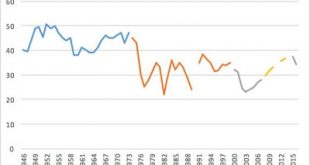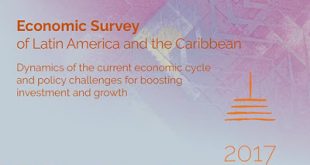The Economist new series on 'big ideas' tackled in a recent issue the concept of the natural rate unemployment (subscription required; other ideas included Say's Law and Human Capital, just to give you the broad picture of what they think it's big). I will only comment very briefly on two issues, one related to the history of ideas and the other to the concept itself.The Economist suggests that the natural rate of unemployment can somehow be connected to the ideas of Keynes. In their...
Read More »Labor share and super firms
I discussed on several occasions before the worsening of income distribution and the squeeze of the labor share in total income. Figure below provides updated information. Professor Autor and some of his co-authors suggest this in part might result from the rise of the 'superstar firm.' In other words, Facebook, Google (Alphabet), Amazon, Apple, etc and the winner take all economy. This paper (h/t Santiago Capraro) argues that this results from market power reflected in higher mark...
Read More »The Routledge Handbook of Heterodox Economics
(click to enlarge) The Routledge Handbook of Heterodox Economics presents a comprehensive overview of the latest work on economic theory and policy from a ‘pluralistic’ heterodox perspective. Contributions throughout the Handbook explore different theoretical perspectives including: Marxian-radical political economics; Post Keynesian-Sraffian economics; institutionalist-evolutionary economics; feminist economics; social economics; Régulation theory; the Social Structure of Accumulation...
Read More »A theory of economic policy and the role of institutions
Nicola Acocella published a paper in the Journal of Economic Surveys (a free, preliminary version is available here) a paper on the development of the theory of economic policy. Acocella is clearly fully aware of the differences between classical political economics and marginalism (neoclassical economics). And he dismisses the pre-margnialist views on economic policy as being unsystematic and devoid of general principles. In his words: Most classical writers and the marginalists had...
Read More »Racism, the election and more
After writing on Venezuela last week, Trump suggested that the US might intervene there. And then the predictable happened, violence and death ensued... in the US. I don't have much to say about what happened in Charlottesville. It is worth noting that even though the city and the University of Virginia are relatively progressive places these days, they do have a long history that ties them to slavery and white supremacy (see this on NPR; h/t URPE blog).*At any rate, it's not surprise that...
Read More »On Venezuela, Democracy, Violence and Neoliberalism
Many pieces have been written recently on the situation in Venezuela, including some on the left, that are very critical of the Maduro government (see for example this Jacobin piece that has been widely cited). Interestingly, during the sleepy months of the summer in which I almost didn’t write anything here, this old post on Venezuela has become the most read on the blog (as we approach almost 3 million hits).Let me first say that I am for democracy and against violence, irrespective of...
Read More »The wage share in Argentina
In his book, Estudios de Historia Económica Argentina, Eduardo Basualdo has several tables with the data for the share of wages in income. Sources seem to be different and not necessarily compatible (although I 'm not sure about that). He also published a paper in 2008 with additional data. The graph below adds the numbers shown here, which I think are also from Basualdo (the newspaper only cites CIFRA; I couldn't find another source in their website). To the extent that one can trust...
Read More »Economic Survey of Latin America and the Caribbean
The Economic Commission for Latin America and the Caribbean´s (ECLAC) Economic Survey of Latin America and the Caribbean (“Dynamics of the current economic cycle and policy challenges for boosting investment and growth”) for 2016-2017 was published last Thursday (3 of August). It incorporates a number of heterodox concepts and ideas mainly in Part II. These include the notion of center and periphery (which provides the framework for Chapter III “The region’s current economic cycle and...
Read More »The positive profit with negative surplus-value paradox
New paper by Lucas (not that one) and Serrano. From the abstract: This paper explains the “positive profits with negative surplus-value” example of Steedman (1975) and shows that while in joint production systems individual labour values can be negative, the claim that the total labour embodied in the surplus product of the economy (surplus-value) can also be negative is based on assumptions that have no economic meaning (such as negative activity levels). The paper also provides a way to...
Read More »On job numbers, the stock market and more at the Rick Smith Show
[embedded content] Full show here. I'm interviewed at around 1:03 into the show, and the whole thing is about a bit less than 20 minutes long.
Read More » Naked Keynesianism
Naked Keynesianism





